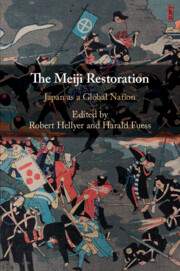Book contents
- The Meiji Restoration
- The Meiji Restoration
- Copyright page
- Contents
- Figures
- Tables
- Contributors
- Acknowledgments
- Notes on Conventions
- Introduction
- Part 1 Global Connections
- 1 Japan and the World Conjuncture of 1866
- 2 Western Whalers in 1860s’ Hakodate
- 3 Small Town, Big Dreams
- 4 The Global Weapons Trade and the Meiji Restoration
- Part 2 Internal Conflicts
- Part 3 Domestic Resolutions
- Suggestions for Further Reading
- Index
2 - Western Whalers in 1860s’ Hakodate
How the Nantucket of the North Pacific Connected Restoration Era Japan to Global Flows
from Part 1 - Global Connections
Published online by Cambridge University Press: 14 April 2020
- The Meiji Restoration
- The Meiji Restoration
- Copyright page
- Contents
- Figures
- Tables
- Contributors
- Acknowledgments
- Notes on Conventions
- Introduction
- Part 1 Global Connections
- 1 Japan and the World Conjuncture of 1866
- 2 Western Whalers in 1860s’ Hakodate
- 3 Small Town, Big Dreams
- 4 The Global Weapons Trade and the Meiji Restoration
- Part 2 Internal Conflicts
- Part 3 Domestic Resolutions
- Suggestions for Further Reading
- Index
Summary
Hundreds of foreign whaling ships stopped in newly opened Japanese treaty ports between 1855 and the overthrow of the Tokugawa regime in 1868, particularly in the northern harbor of Hakodate. These vessels not only reprovisioned there but also trained the first generation of Japanese sailors in pelagic whaling techniques. Those men, the recipients of northern Japan’s first passports, not only embodied the first permitted travelers overseas but also later launched deep sea fishing initiatives as Japan transitioned from an Asian to a Pacific nation. This chapter traces that trajectory through whaling ships’ logs and records of the Hakodate Magistrate’s office, placing trans-Pacific documents in conversation to explore how maritime activities in the island of Hokkaido connected Restoration era Japan to global flows of human movement.
Keywords
- Type
- Chapter
- Information
- The Meiji RestorationJapan as a Global Nation, pp. 40 - 61Publisher: Cambridge University PressPrint publication year: 2020

